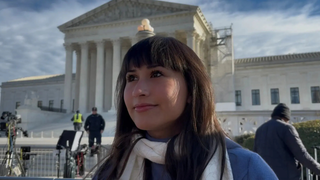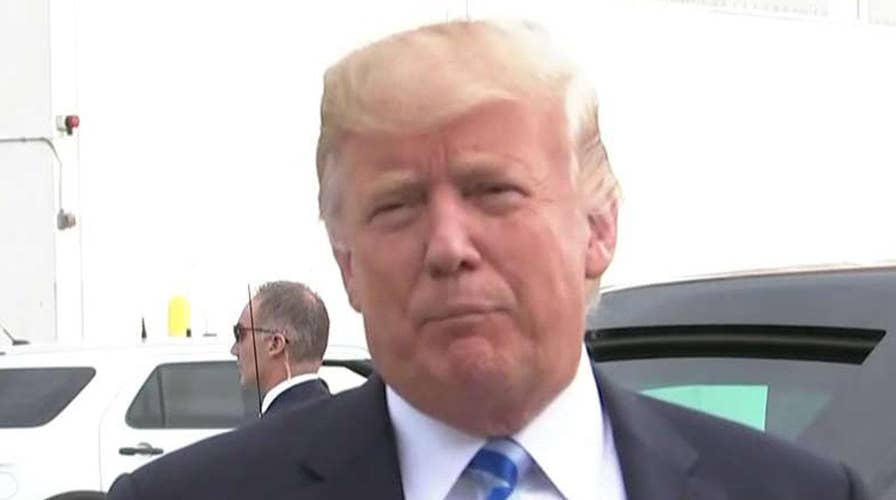Trump: I feel very badly for Paul Manafort
President Trump comments on guilty verdict for his former campaign manager, says verdict has nothing to do with Russian collusion.
President Trump’s former personal attorney Michael Cohen’s guilty pleas Tuesday are unlikely to result in criminal charges against the president. But the pleas admitting to campaign finance violations could be used by Democrats to try to impeach the president, should they win control of the U.S. House in November.
Cohen said in his guilty pleas in U.S. District Court in New York City that he had failed to pay taxes on his taxi business and misrepresented his assets in a loan application. Cohen also pleaded guilty to violating campaign finance laws when he arranged for hush-money payments shortly before the 2016 presidential election to two women who claimed they had extramarital affairs with Trump. The president has denied having these affairs.
Cohen will be sentenced later this year. His plea deal may help him avoid a sentence of over 60 years in prison.
A jury could potentially find the payments to the women to be a violation of campaign finance laws, because the money paid to them was meant to aid Trump politically, and was above and beyond the contribution-limit for donating to a candidate’s campaign. It wouldn’t be illegal for Trump to make these payments, but Cohen claims that Trump ordered him to orchestrate the payments, which could be a crime.
Cohen said he arranged the payments of $130,000 to porn star Stormy Daniels (whose real name is Stephanie Clifford) and $150,000 to former Playboy model Karen McDougal “in coordination and at the direction of a candidate for federal office” – Donald Trump.
Because of that, even though Cohen’s plea didn’t include a cooperation agreement with prosecutors, many are speculating that in an effort to reduce his prison sentence Cohen will cooperate with Special Counsel Robert Mueller to go after the president.
But Mueller is investigating Russia’s interference in the 2016 U.S. presidential elections and allegations that Trump or his campaign conspired with the Russians to defeat Hillary Clinton. No one is alleging Russia had anything to do with the payments made to Daniels or McDougal.
Of course, the Cohen guilty plea received heavy coverage in the media. The stock market dropped after-hours. Rep. Adam Schiff, D-Calif., who sees collusion under every rock and around every corner, said the development added to the president’s “legal jeopardy.”
The anti-Trump “resistance” – people who wake up every day hoping that the president will be removed from office – found a moment of happiness. The happiness won’t last long.
This controversy is ultimately a political matter – even if prosecutors conclude Cohen is telling the truth, Justice Department guidelines say a sitting president can’t be indicted. If Democrats want to remove President Trump from office, the proper avenue is impeachment.
But Trump-hating Democrats who pursue impeachment will be punished by the American voter – the more Middle America learns the facts of the Cohen case, the worse the president’s opponents will look.
Go back to square one. Once the allegations about the payments to Daniels and McDougal were publicized in media reports, the U.S. Attorney’s Office for the Southern District of New York – at the behest of Mueller – got a search warrant for Cohen’s office, home and hotel room where he was temporarily staying.
FBI agents raided the locations in April. Deputy Attorney General Rod Rosenstein, who is overseeing Mueller’s Russia investigation, signed off on the raids.
The shocking thing is that the Justice Department got a judge to approve the raids, despite attorney-client privilege that should have protected communications between Cohen and his client, Donald Trump.
That’s a big problem. In the president’s words, it is “Inconceivable that the government would break into a lawyer’s office (early in the morning) – almost unheard of.” He’s exactly right.
The Justice Department, however, claimed that it was protecting attorney-client privilege because its people were sifting through Cohen’s documents and determining what was privileged and what was not. That is reprehensible.
In the words of attorney and law professor Alan Dershowitz, “the very fact that this material is seen or read by a government official constitutes a core violation (of the Sixth Amendment). It would be the same if the government surreptitiously recorded a confession of a penitent to a priest, or a description of symptoms by a patient to a doctor, or a discussion of their sex life between a husband and wife. The government simply has no right to this material.”
The Justice Department’s excuse for this behavior is the little-used “crime-fraud exception” to the rule of attorney-client privilege. The theory is that Cohen’s payments had constituted a crime co-committed by Cohen and Trump, which would negate any attorney-client privilege between them on this matter.
The problem with this fudge is that President Trump has still not been credibly implicated in a campaign finance violation. Trump has already admitted, through his lawyer Rudy Giuliani, to compensating Cohen for his payment to Stormy Daniels – though Trump says he did not know about the payment until after it was made.
As for the payment to McDougal, American Media Inc. (AMI), the parent company of the National Enquirer, made the payment, not Michael Cohen. And it is unclear if Cohen ever actually compensated AMI for its payment.
And what if everything Cohen stated in his guilty plea is true?
Remember former North Carolina Democratic U.S. Sen. John Edwards? Donors paid $1 million to Edwards’ mistress to keep quiet just before the 2008 Democrat presidential primaries when Edwards was a candidate.
Federal prosecutors charged Edwards with campaign finance violations but he was acquitted, largely because the contributions didn’t go directly to his campaign, though Edwards also argued that the payment was meant to hide his extramarital affair from his dying wife. There’s even a name for this sad business – the “mistress loophole.”
There are other problems with the Cohen case that are less concrete but should still be mentioned. Cohen is smarmy, but smarmy or not, he has an incentive to cooperate with prosecutors to get the lightest punishment possible for his crimes.
If Cohen doesn’t cooperate, or maybe even “compose,” he faces the possibility of spending the rest of his life in prison. The fact that Cohen’s lawyer is Clinton-confidant Lanny Davis, and that the judge in the case is Kimba Wood – who was almost Bill Clinton’s attorney general – might raise a few eyebrows as well.
To many Americans, it seems that men like Cohen, former Trump presidential campaign chairman Paul Manafort (who was convicted of tax evasion and bank fraud charges Tuesday), and former National Security Adviser Michael Flynn (who has pleaded guilty to lying to the FBI on highly suspect grounds) have been targeted for prosecution simply because of their association with Donald Trump.
We now live in a country where pundits on the left explicitly hope that people working for President Trump will be prosecuted. In other words, they argue that the selective use of justice is a good thing if it is directed against conservatives or supporters of the president.
That is chilling. Without a concerted effort from the American people to condemn such political prosecutions, things will only get worse.









































